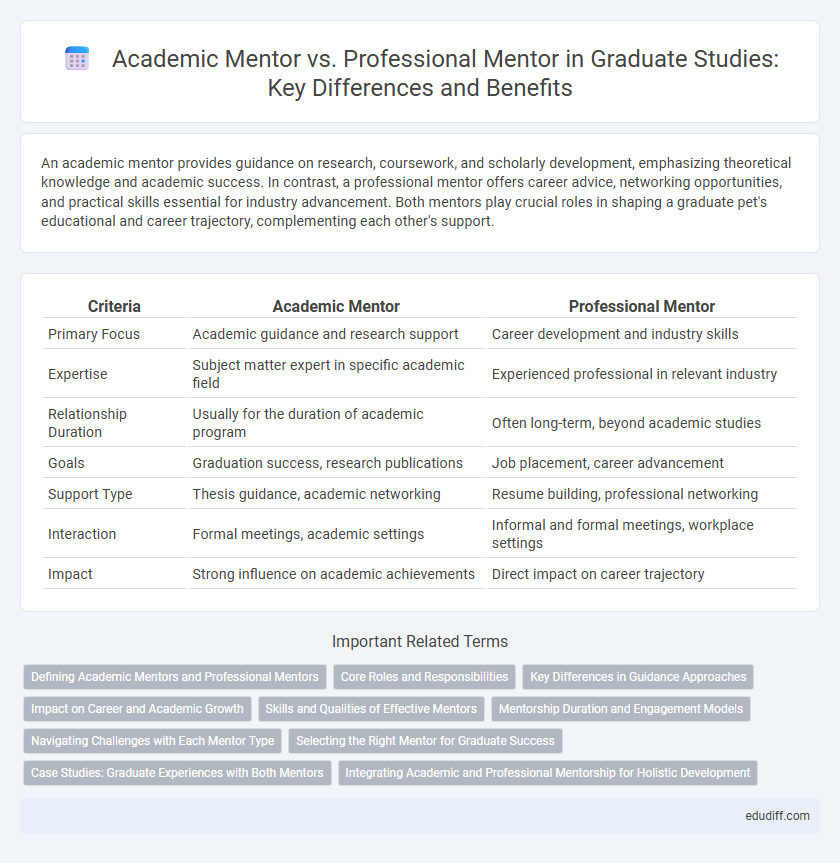An academic mentor provides guidance on research, coursework, and scholarly development, emphasizing theoretical knowledge and academic success. In contrast, a professional mentor offers career advice, networking opportunities, and practical skills essential for industry advancement. Both mentors play crucial roles in shaping a graduate pet's educational and career trajectory, complementing each other's support.
Table of Comparison
| Criteria | Academic Mentor | Professional Mentor |
|---|---|---|
| Primary Focus | Academic guidance and research support | Career development and industry skills |
| Expertise | Subject matter expert in specific academic field | Experienced professional in relevant industry |
| Relationship Duration | Usually for the duration of academic program | Often long-term, beyond academic studies |
| Goals | Graduation success, research publications | Job placement, career advancement |
| Support Type | Thesis guidance, academic networking | Resume building, professional networking |
| Interaction | Formal meetings, academic settings | Informal and formal meetings, workplace settings |
| Impact | Strong influence on academic achievements | Direct impact on career trajectory |
Defining Academic Mentors and Professional Mentors
Academic mentors guide graduate students through research methodologies, coursework, and scholarly development, emphasizing theoretical knowledge and academic skills. Professional mentors focus on career advancement, industry insights, networking opportunities, and practical skills relevant to the student's chosen profession. Both types of mentors play essential roles in shaping a graduate's academic success and career trajectory.
Core Roles and Responsibilities
Academic mentors guide graduate students through research methodologies, curriculum planning, and academic skill development, ensuring successful degree completion. Professional mentors focus on career planning, networking opportunities, and industry insights to prepare graduates for workforce integration. Both mentor types play critical roles in shaping a student's academic growth and professional success.
Key Differences in Guidance Approaches
Academic mentors primarily focus on enhancing research skills, coursework, and theoretical knowledge within a specific discipline, guiding graduate students through academic challenges and institutional requirements. Professional mentors emphasize career development, networking opportunities, and practical industry insights, helping graduates transition into the workforce and achieve long-term career goals. The key difference lies in academic mentors fostering scholarly growth and professional mentors supporting real-world application and career advancement.
Impact on Career and Academic Growth
Academic mentors provide crucial guidance in research methodologies, theoretical frameworks, and academic networking, significantly enhancing a graduate's scholarly development and publication opportunities. Professional mentors focus on practical skills, industry insights, and career navigation, accelerating employability and long-term career advancement in specific sectors. The combined influence of both mentors fosters a well-rounded trajectory, balancing academic excellence with professional readiness.
Skills and Qualities of Effective Mentors
Effective academic mentors demonstrate deep subject expertise, strong communication skills, and the ability to guide research and critical thinking, fostering academic growth and intellectual development. Professional mentors exhibit industry-specific knowledge, networking capabilities, and practical experience, focusing on career advancement, skill application, and workplace navigation. Both types of mentors require empathy, active listening, and a commitment to mentee development, tailoring guidance to individual goals and challenges.
Mentorship Duration and Engagement Models
Academic mentors typically engage with graduate students over several years through structured meetings aligned with coursework and research milestones, fostering long-term development within an educational setting. Professional mentors often provide shorter-term, flexible guidance focused on career advancement, utilizing diverse engagement models such as one-on-one coaching, networking sessions, or project-based collaborations. The duration and intensity of mentorship in academic contexts emphasize sustained intellectual growth, while professional mentorship prioritizes adaptive, goal-oriented support tailored to evolving industry demands.
Navigating Challenges with Each Mentor Type
Graduate students face distinct challenges when working with academic mentors, who provide specialized research guidance and help navigate institutional expectations, while professional mentors offer career-oriented advice and networking opportunities outside academia. Academic mentors may present challenges related to rigorous research standards, publication pressures, and balancing coursework, whereas professional mentors often challenge graduates to develop soft skills, industry insights, and professional identity. Effectively navigating these mentor relationships requires understanding their unique roles, setting clear expectations, and leveraging their strengths to overcome both scholarly and career obstacles.
Selecting the Right Mentor for Graduate Success
Choosing the right mentor for graduate success involves understanding the distinct roles of academic and professional mentors. Academic mentors provide guidance on research methodologies, coursework, and academic networking essential for scholarly achievements. Professional mentors offer career advice, industry insights, and help develop skills for long-term career growth beyond academia.
Case Studies: Graduate Experiences with Both Mentors
Graduate students report that academic mentors enhance research skills and guide thesis development, while professional mentors provide real-world industry insights and networking opportunities. Case studies reveal that combining support from both mentors leads to higher career readiness and confidence in graduate transitions. Data shows graduate success rates improve by 30% when access to dual mentoring is available, emphasizing the complementary value of academic and professional guidance.
Integrating Academic and Professional Mentorship for Holistic Development
Academic mentors provide guidance on coursework, research projects, and intellectual growth while professional mentors offer industry insights, networking opportunities, and career development strategies. Integrating academic and professional mentorship fosters a holistic development approach, enabling graduates to apply theoretical knowledge in real-world settings and build essential skills for future job markets. This combined mentorship framework enhances critical thinking, practical experience, and professional readiness, ultimately bridging the gap between education and employment.
Academic Mentor vs Professional Mentor Infographic

 edudiff.com
edudiff.com